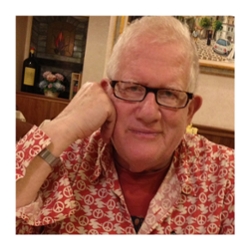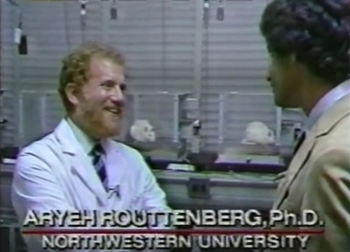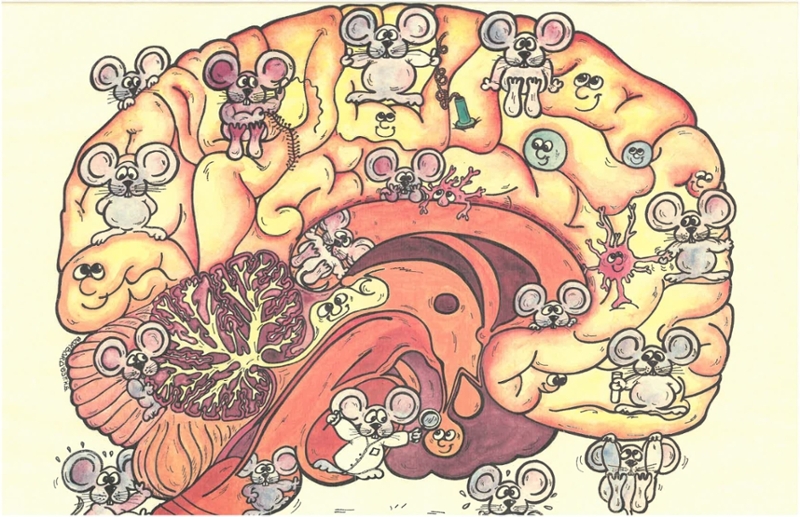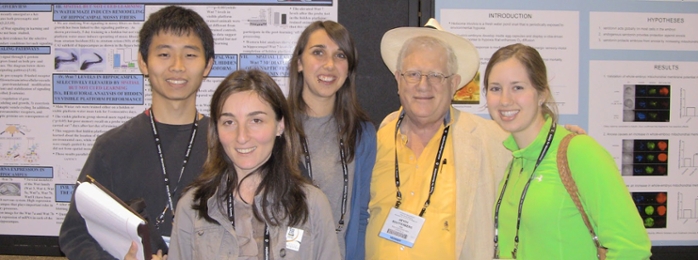In Memoriam
Northwestern Remembers Aryeh Routtenberg
A letter from Dean Adrian Randolph:
Dear Weinberg College Faculty, Staff and Students,
It is with profound sadness that I write you today to communicate the passing this weekend of Aryeh Routtenberg, professor of psychology in Weinberg College.
Professor Routtenberg received his M.A. degree in psychology from Northwestern in 1963 and his Ph.D in behavioral neuroscience from the University of Michigan in 1965. He joined the faculty of Northwestern later that year as an assistant professor in psychology, where he was promoted to associate professor in 1968 and professor in 1973. His research interests included learning and neural plasticity, and much of his work was devoted to understanding how the nervous system stores long-term memories. At Northwestern, Professor Routtenberg was responsible for educating a long line of undergraduate and graduate students who have since gone on to teach and conduct research in the emerging field of neuroscience. Professor Routtenberg was a Fellow of the American Psychological Association and served on the editorial boards of many neuroscience research publications.
I would like to extend my condolences to Professor Routtenberg's family, friends, colleagues and students. The Weinberg College community will feel his loss.
Adrian Randolph
Dean
Weinberg College of Arts and Sciences
Comments From Friends:
If you would like to add a comment to this site, please contact psychology@northwestern.edu. Please include how you knew Professor Routtenberg (ie: NU student, lab assistant, former colleague, etc).
__
I'll miss his witty comments. -Denise Parisi
He got me started on a scientific career when I was a naive freshman at Northwestern looking for a work-study job. I started washing glassware and he didn't fire me when I dropped and broke a graduated cylinder right at his feet in my first week there. He gave me an opportunity to get involved in research as a sophomore. I will always remember him and thank him for his support, encouragement and enthusiasm for science. He was always gracious to me and stayed in touch through the years. My heartfelt condolences and prayers to Rita. He will be missed. - Jose C. Florez (former NU student, Assoc. Prof. Harvard Med., Chief of the Diabetes Unit at the Massachusetts General Hospital)
I, too, started in science in his lab as a freshman at Northwestern in 1978 who needed a work-study job. After interviewing me, Aryeh said "I am going to offer you the job and I'll tell you why. We have about an equal number of jokers and non-jokers in the lab, and I want it to favor the jokers." May he rest in peace. -Larry Cahill (former NU student, Prof. of Neurobiology & Behavior, UC-Irvine)
It's a terrible loss. I didn't know Aryeh well, but I knew him well enough to say that. -Eileen H Bigio (NU faculty)
We have lost one of our most original and courageous thinkers. I feel so privileged to have been the beneficiary of his generous mentorship and support since my recruitment to Northwestern. Just a couple of months ago he gave me his feedback on my grant proposal: “The next sentence causes existential heartburn in my putamen”. How can you not learn from this? He will be much missed. -Jelena Radulovic (NU faculty)
Aryeh had a profound influence. The Cresap Neuroscience Laboratories own him a debt for first convincing the university administration to provide a new home for psychological research. He inspired students in his lectures and in his laboratory, as well as trainees in his neurobiology-of-information-storage training program, who have populated all aspects of neuroscience. Cresap won’t be the same without him. - Ken Paller (NU faculty)
Aryeh's teaching and mentorship was invaluable in my education, and in so many others'. He challenged me to not only think before I spoke, but during and after, as well. He taught me to accept criticism with gratitude, and to value those individuals, like himself, who demonstrate a generosity of spirit in the depth and detail of their critique. He is missed deeply and remembered well. -Katie Leaderbrand (NU student)
He will always hold a special place in my heart. We met by chance, he needed a graduate student in the department to proctor an exam, and I agreed to help. We began chatting, and before I knew it, we were meeting weekly to arm chair theorize, as he called it, about the neurobiology of learning and memory. There were times when we would start out discussing synaptic plasticity, and before I knew it two hours had gone by and we were talking about classical music or world history. We covered just about every topic under the sun. I will miss our conversations. - Sam Wootan (NU student)
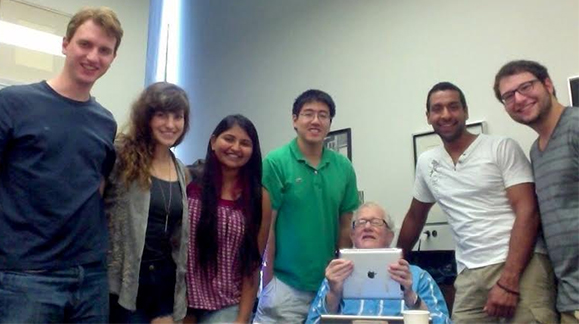
He was a brilliant professor, researcher, and mentor who strongly influenced my decision to pursue interdisciplinary neuroscience research. I wish I had one more chance to thank him for the profound impact he had on my academic choices and growth. Since I will never have another opportunity to do so in person, I'm going to thank him here:
Thank you for encouraging and enabling learning outside of the classroom. Thank you for teaching me to be tougher in the face of adversity. Thank you for all the books that you lent and gave to me. Thank you for the C. elegans jokes and funny videos. Thank you for letting me keep a Snuggie in the lab so I could nap between late-night experiments. Thank you for hiring other amazing research assistants, some of whom I hope will be lifelong friends of mine. Thank you for believing in my potential and pushing me towards it. Thank you, Dr. Routtenberg. I'll never forget you. -Melissa McSweeney (NU student)
Losing Aryeh is a tremendous loss. He held his students to high standards, and they met them. He was nothing if not himself - polka-dotted shirt, brimmed hat, suspenders, and all. And above all else, there was something incredibly romantic about his approach to truth and science. -James Antony (former NU student)
I was the first female to survive Aryeh's graduate program (1969-74). I was always terrified that he would yell at me and embarrass me in front of others (being Asian, loss of face is not a good thing). He never did subject me to that, even the day when we were still at Kresge Hall when I unthinkingly and stupidly dumped a dish of hot paraffin down the sink. He had the quickness of mind to run the hot water to prevent a call to the plumber. He did scare me to death when one evening at Cresap Lab, I was about to enter the dark room as Aryeh was exiting. When the revolving door opened on my side, Aryeh was dressed all in black and all I saw was this pale face and red hair against the black background and I freaked out.
When we were still at Kresge Hall, we welcomed his second child/first son Noam and Aryeh became the youngest full professor at NU at that time. When I last saw him about 1.5 years ago, we were talking about retirement, I asked him if he was then the oldest full professor at NU. He thought that was a good question and that he would find out, but I never did get an answer.
Although I switched fields after a couple of postdoctoral fellowships, the communication and problem solving skills I acquired as a student in his lab were invaluable and a distinct advantage in my IT career.
It was my fortune to have remained in Evanston to this day and to become friends with Aryeh. We tried several times unsuccessfully to meet overseas during our international work travels, but the trips never aligned. We did manage to get together in Evanston about once a year for his birthday. He would sometimes give me copies of his papers which quickly became Greek to me. I was grateful to have remained in touch and be invited to his Christmas parties and summer home. I am grateful to be part of the collective that carries Aryeh's imprint. -Becky Santos Anderson (former NU student)
When I got the news yesterday of Aryeh's death, I was immediately overwhelmed by waves of memories of his profound influence, not only when I was at Northwestern, but ever since.
My first experience with Evanston was on a glorious sunny day in August, 1970. It was a pre-move trip (remember, this was 1970!) to find an apartment and meet the man who was to be my graduate advisor. I knocked on his door at Kresge Centennial Hall; but he couldn't invite me in. There was no room in the phone booth (does anyone know what that is anymore?) that served for his office. Within the small space sat a red-headed man not that much older than I. He was surrounded by books and journals and a shiny yellow 1-speed road bike that had to stand vertically in order to fit.
We talked briefly. He listed three of his current research areas, and asked me to think about which one I'd like to pursue when I started my work in September. I knew I'd choose brain-stimulation reward.I left feeling wanted and energized. I was lucky to find an apartment on Washington Avenue within a few hours. But now I had another compelling question for Aryeh, so I went back to his office: "Where can I get a bike like that?" Aryeh told me he got his at The Pony Shop, on Chicago Avenue.
When I arrived back in September, my first purchase was a shiny yellow 10-speed road bike from the Pony Shop. I wanted to be like him. I still do. That will never change. I've had many bikes since then; but I never got rid of my favourite one. I still ride it today, and the Pony Shop is still on Chicago Avenue.
There are hundreds of ways in which Aryeh helped shape who I am....hundreds of stories...hundreds of warm, sweet memories of that great man who, as we all know, was not himself always warm and sweet in the ways he taught us. Somehow I knew even then that his unwavering motivation was to teach us well, so that we'd never forget the fundamentals: hard work; perseverance; excellen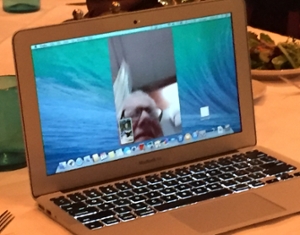 ce in methodology; the importance of clarity in teaching; and many more.
ce in methodology; the importance of clarity in teaching; and many more.
If there ever is to be an anthology of stories about Aryeh, I'll be glad to share mine - stories of really bad coffee in Kresge's basement; all-nighters in Cresap; Friday meetings that first made me cringe and later made me proud.
When I and a small group of Routtenbergians gathered in a Chicago eatery last October to pay tribute to him, Aryeh could not oblige us with his presence. He gamely Skyped with us one-by-one from his hospital bed.
I had hoped to come back and visit when he was feeling better. We e-mailed back and forth a few times, but I wasn't able to see him again.
He was a mensch and a friend. And I already miss him. With love, -Ron Clavier (former NU student, Clinical Psychologist and Author)
Aryeh and I were, for many,many years (until Nestor Schmajuk was hired) the whole BBC program. So we competed for resources (grad students, etc). Since he came here before I did by 5 years, he always outranked me-- for 8 years-- until I became a full professor. He thus treated me and mine rather roughly in the early years, and he and I were always fighting. I recall one time he lost one of his own cables, assumed (heaven knows why) that one of my lab "borrowed" it. He cornered that gentle chap (Bruce Hetzler) in the hall and yelled, "Make me a cable!!!" Hearing this (from many doors away), I ran out with a wooden pointer, tapped Aryeh on the shoulder with it, and said, "Poof! You're a cable!"
That was how it went, yet, away from work, he was charming, cultured, and very funny. And generous. He wined and dined my wife and me when I received Hannah Gray's call, bestowing tenure.
I think Aryeh and I were the longest standing couple in Psychology still at Northwestern in 2015. So, even after all the wars, his passing makes me think of Baudelaire's lines, ..."Mon semblable, mon frere!"--and of course, I really do miss him. - J. Peter Rosenfeld (NU faculty)
I’m very sorry to hear of Aryeh’s passing. He was certainly a big personality who influenced many people!
When I tried to join the lab as a sophomore he said no. It took me two more tries before he let me in. It was an ideal setting to appreciate both the difficulties and the benefits of a career in science. - David Amaral (former NU student)
As one of, if not the, last graduate students to come out of Aryeh's lab, I can attest to the tough love and great training that I received from him (though I know many of you claim that he "softened" somewhat in his later years). I left his lab a better thinker, writer, and scientist than when I entered. May he rest in peace. - Jerry Rekart (former NU student)
As a student in the first class he ever taught at Northwestern, Aryeh introduced me to the infinite wonders of the brain and seduced me away from my at the time plan to become a clinical psychologist. :) Working as his lab technician from March to August 1967 (give or take) gave me skills that I have rarely had to use since I finished my MA at McGill, but definitely got a lot of mileage out of -- how many people can say that they were either a rat neurosurgeon or a rat orthodontist?
I am glad that I had the opportunity to talk with him, albeit by Skype, in October at the SFN lab reunion dinner. -Sue McKenzie (former NU student)
It is quite remarkable to see this long list of people whose careers were positively influenced by Aryeh and I consider myself as one of them. I joined his lab as a postdoc back in 2006 and formerly trained as a geneticist and molecular biologist he profoundly transformed my thinking about science. I remember long arguments and discussions about the 'memory trace', 'synapse tagging hypothesis' and so on with him and how much he wanted me to think as a true neuroscientist and shift away from being just a 'molecularist' by 'reformatting, reconfiguring, rethinking, retooling' as he used to tell me. As all of you know he was tough to work with which led to frustrations at times but looking back it was one of the best times in my career. Today I am a better thinker, writer and neuroscientist in general and for this I will forever be grateful to him.
He passed away, but his legacy will live on. - Nino Tabatadze (former NU student, NU faculty)
Aryeh had a powerful impact on many. I hope that we all carry on something good that we received from him. While it may scare some of us, we are, in effect, his neuroscience kids. - Ray Akers (former NU student)
I took Aryeh's physiological psychology class in 1977 to fill a distribution requirement (I was a biochemistry major). I had not known that neuroscience existed or that science could be interesting until I took that class. And it was really the only time at NU that a professor engaged the class in challenging dialog. Next thing I knew, I was working in his lab! I can truly say that Aryeh changed my life. If there is an afterlife, he is sitting up there making snarky comments about this thread, but he has to feel a lot of pride too. I think it is amazing to think of the enormous chain reaction Aryeh set into motion by recruiting so many of us to neuroscience. I'm grateful. - Marina E. Wolf (former NU student, NU Department of Neuroscience faculty)
I suppose this thread will be it's own celebration of the impact he had on all of us. I agree that I would love to hear his comments on all our stories.
I had the pleasure of working with Aryeh twice in my career, first as an undergrad trying to decide between business and science (I chose business) and then again as a post-bac trying to make the same decision (I chose medical science). I was lucky that he let me back into the lab, but he always thought that medicine was where I should be and his recommendation was a huge factor in turning my career around.
I appreciate the tough love in the lab but I also experienced the fun side with trips to the lake and rides on his pontoon boat.
I would like to say thank you to Aryeh for everything and let him know that his legacy will live on. - Pitud Rangsithienchai (former NU student)
I spent a huge portion of the first three years of my undergraduate career (1976-1978) quaking in my shoes - seemed there was no end to the ways in which he would challenge and berate me. Apparently I completely lack the sense of humor required to spar with him.
But the opportunities staying afforded me- to directly participate in the work of the lab- to see some of the first catecholamine neurons florescence - to attempt the audacious task of visualizing synaptic plasticity with electron microscopy to capture dynamic changes in spines - made me persevere.
I still remember my delight when some 20 years after leaving the lab, after tremendous technological advances enabled someone to actually visualize those synaptic spines changing, I felt vindicated that his criticism of my failure to capture them in the tiny sample of static time points was completely inappropriate, and totally euphoric that I had joined him on a quest that was ultimately a true one.
I often tell people that I knew how passionately I wanted to be a neuroscientist because I became one despite Aryeh. And yes, I agree he is chortling over this thread where ever he is.
Be well my fellow Aryeh-ians- Randy L. Gollub (former NU student, Associate Director for Translational Research, Massachusetts General Hospital)
I remember fondly my undergrad days with Aryeh in Cresap over 30 years ago. Maybe my memory is spinning it more in the positive direction. There was the pall of fear over the lab on the day progress report meetings. You knew it was bad when he handed back your report face down, as if not a ray of light should ever fall on it again. There was the tough love (“that’s bullshit. You wanna do bullshit, go someplace else”). There were also good times like practicing duets with him (him 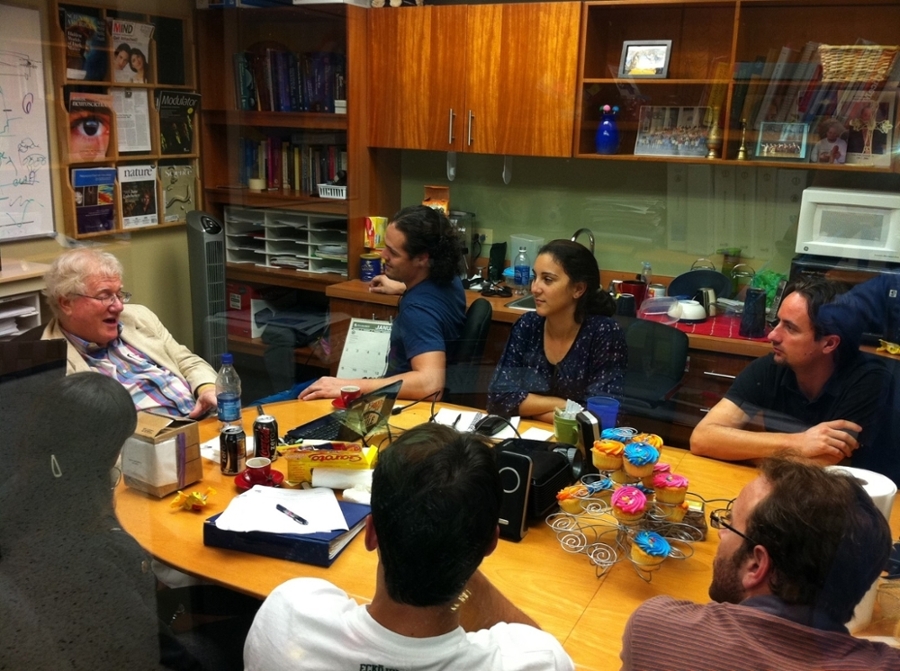 on flute and me violin) “Don’t forget I'm the professor and you're the student…”. Like all of you, I realize how much I got from Aryeh in how to think about and do science. Him shuffling into the lecture hall in Cresap with his coffee mug and bright red hair, and refreshingly irreverent attitude. That’s what turned me on to neuroscience – it was all due to him. In recent years, he made yearly visits to Puerto Rico and spent considerable time with my students, talking about his ideas and reviewing their projects. As I watched their faces, I realized he was having the same positive effect on them as he had on me when I was their age, only the red hair was gray. We will miss our “abuelo” of neuroscience… - Greg Quirk (former NU student)
on flute and me violin) “Don’t forget I'm the professor and you're the student…”. Like all of you, I realize how much I got from Aryeh in how to think about and do science. Him shuffling into the lecture hall in Cresap with his coffee mug and bright red hair, and refreshingly irreverent attitude. That’s what turned me on to neuroscience – it was all due to him. In recent years, he made yearly visits to Puerto Rico and spent considerable time with my students, talking about his ideas and reviewing their projects. As I watched their faces, I realized he was having the same positive effect on them as he had on me when I was their age, only the red hair was gray. We will miss our “abuelo” of neuroscience… - Greg Quirk (former NU student)
I had a pretty different experience with Aryeh as I never officially worked long-term in his lab or even went into neuroscience (much to his constant berratement and dismay). I took his class and then, bored of the other possibilities, told him I wanted to take his small-group intensive class for juniors or seniors (I forget what they call these now), but he told me we had to interview to get in and that I would need to prove I wasn't boring. Our interview was a mess. Somewhat purposely I decided that antagonizing him was likely my best course of action in not seeming boring and while it certainly made for lively conversation, we both found out how stubborn (and similar) we were that day. I returned to my room to pick another class as I was positive I wasn't getting into that one. I heard from him that night via email stating that I could not take the class because I was the only one he interviewed suitable to be in it and you had to have a minimum of 3 people. I wrote back that that was a shame since I thought that a critique of his latest work on GAP43 in mice memory storage seemed like a good topic for the class. He wrote back that if I wanted to complete an "independent study" instead of a class that I was welcome to try to tackle that subject. I did. Those months of verbal sparring, mentorship, education on HOW TO THINK, and promises made about retirement as soon as his cactus grew to the ceiling (anyone remember this?) were some of the most trying and yet rewarding times of my scholarly life. I told him I wanted to be a pediatrician and he told me it was a waste of talent and time. I asked him for a letter of recommendation to medical school and he told me he just couldn't help me commit to the wrong field. I told him I would clean up his hideously unorganized office, sit in on every lab meeting and brainstorm with him afterwards for three months (this was as close as I would get to bench research), and take him to a steak dinner if he would write the letter. He agreed (I can't even get into the conversations we had while I tried to undo the office hoarding). I never saw that letter until 3 years later in my file at med school and I've strived every day to live up to its description of me. I visited Chicago twice since then and saw him both times. The first was while interviewing for residency when we had dinner and he told me I still had a chance to change my mind and go into primarily neuroscience research. The second was a few years ago when he reluctantly admitted that my mind was for science but it was clear that my heart was for medicine (I was never able to convince him that the two were truly connected in daily practice). I considered this as high praise as I would get. What a wonderful mentor, friend, pain in the butt, and man. -Abby Kissel (former NU student)
I wanted to share a letter that AR wrote to my son who was born when I was doing my post-doc in the lab (2005). I am sure we all shared similar “holy shit, what did I do now?!” experiences under the guidance of AR and I certainly had my share of quaking in my booties. Anyone who has a record of weekly progress reports can attest to those Fridays of getting the reports submitted before 5:00 and the Monday afternoon march of uncertainty into the office to go over the report. As my son was born on a Friday, I missed one of those deadlines. I then received an email the following week with an attachment and nothing in the body of the email. A sense of despair fell over me. I opened the attachment and read the letter. It brought a tear to my eye and I came to the realization that he really did want us to do well and succeed and be prepared for what lie ahead. Of course, in the heat of the battle, that was lost. Now, reflecting back, I can honestly say I am a better scientist, administrator, mentor, father, because of his tough love. With the possibility of after-life repercussions for sharing this letter, I think it is valuable to remember the man who was but did not always let that through. - Matthew Holahan (former NU student, faculty at Carleton University, Departments of Neuroscience and Psychology) Read the letter from Aryeh to little Benji
When Donald Hebb died, in 1985, I felt it personally. As a graduate student at McGill University, I had got to know him pretty well, and I viewed him as a mentor. His presence was a constant in my life, and in my Corcoran-centric view of the universe I thought he would be around forever. Similarly, word of Aryeh’s death hit me at a personal level. Aryeh was my original mentor, the one who seduced me into neuroscience, and I thought he too would be around forever.
As a clueless third-year Psychology major at NU, I took the course Motivation and Emotion, which started in January 1966, and I did not anticipate either the content or the effect it would have on me. Here was this little redhead with the strange name talking about neural mechanisms of reward, plastic synapses, receptive fields, and cell-assemblies. Woah, this was stuff that excited and intrigued me. Somehow I worked up the courage to ask him about working in his lab, and I ended up becoming a research assistant and then an independent study student for the next 20 or so months.
What was Aryeh like in those early days at NU? (Incidentally, I did not at the time realize that he was only 6 years older than me). Well, as many other former students have testified, he was brilliant, inspirational, incredibly creative, and very hard working. He also was always demanding, usually abrasive, and occasionally outrageously offensive. Let us say that he often could be somewhat lacking in the social graces. But in addition to the terror he evoked in me, he also generated some fond memories:
Aryeh was unafraid to ask unusual questions in his research, and in summer 1966 (as I recall) he wondered whether the iguana would display intracranial self-stimulation. So he implanted electrodes in the hypothalamus of an iguana and let it go at it in an operant chamber. Except it didn’t – it showed no interest in ICSS. So he decided to perfuse the brain, to see where the electrodes were located. One Saturday morning he anesthetized the critter, flushed it with saline, and then applied the formalin. I remember him exclaiming in shock and jumping back as the dead iguana righted itself and started walking around, its head going from side to side. Evidently its motor patterns were hard-wired, just like in some politicians.
Aryeh’s fearlessness extended well beyond iguanas, to questions about memory in beetles, ultrastructural features of hippocampal synapses, fiber pathways associated with ICSS, single-unit activity during hippocampal theta, neuroanatomical features of the hippocampal formation, and the molecular mechanisms of long-term plasticity, a topic that dominated his research for many decades. Not many neuroscientists display such a virtuoso approach and eclectic interests.
I recall Aryeh visiting the University of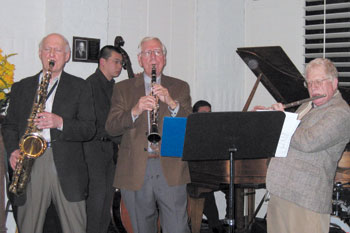 British Columbia, where I was a postdoc in the 1970s. He went to lunch with Chris Fibiger, Tony Phillips, and me, and we watched in amazement as he downed several double vodka martinis during the meal. We were impressed that he was able to sit upright and retain consciousness while continuing to converse at a high level. And converse at a high level he did, with clarity (usually), wit, and forceful arguments.
British Columbia, where I was a postdoc in the 1970s. He went to lunch with Chris Fibiger, Tony Phillips, and me, and we watched in amazement as he downed several double vodka martinis during the meal. We were impressed that he was able to sit upright and retain consciousness while continuing to converse at a high level. And converse at a high level he did, with clarity (usually), wit, and forceful arguments.
I recall that he was a high-maintenance visitor when he subsequently came to the universities where I held faculty appointments, the University of Victoria and later the University of Saskatchewan , as an invited lecturer. He would not get his motor running before 10 a.m., he would not walk any distance, even the one block from my house to the medical school, and every afternoon he had to have a rest break, a requirement I can now relate to. Nonetheless, he intrigued, provoked, and inspired our students and even my jaded colleagues. His brilliance, originality, and sense of humor won the day.
In addition to his empirical prowess, Aryeh was also a prolific theoretician, with a particular concentration in the past few decades on the potential molecular substrates of memory. However, Aryeh’s theoretical positions on the substrates of memory have exerted less of an influence than I think they and he deserve. Although his idea that posttranslational changes in synaptic proteins mediate plasticity is coherent and compelling, and his data in support are excellent, he still seems to be arguing from a minority position. The position advocated by Eric Kandel, that synaptic tagging and plasticity are due to changes in the structure of neuronal DNA, seemingly remains the dominant and more popular theory. In a moment of candor that I think related to this controversy, Aryeh confided to me that he would never be a candidate for the really big prizes because he too readily offends people. So his brash self-confidence and assurance coexisted with real self-insight.
In balance, I will always be exceptionally grateful to Aryeh for inspiring me to enter the field of neuroscience, my life’s work, and for serving as a model for how to perform research and operate a lab. In particular, I am grateful that he urged Sue Wicks McKenzie, Chuck Malsbury, and me to apply to McGill University for graduate work, because he considered it to be the best program in physiological psychology at the time (1967). The fact that Aryeh had received his undergraduate training at McGill, where he worked with Hebb and Peter Milner, might have had something to do with it. In any case, he considered it a real coup that all 3 of his first undergraduate students were accepted at McGill. For me it was a life-changing experience to go to McGill and be exposed to faculty members such as Hebb, Peter Milner, Dalbir Bindra, Al Bregman, Brenda Milner, and Ron Melzack, and, perhaps more important, to rub shoulders with graduate students such as Ron Racine, John O’Keefe, Zalman Amit, Lynn Nadel, Roy Wise, and many others. I would not have been there if it had not been for Aryeh Routtenberg.
It is hard to imagine life without Aryeh.- Michael Corcoran (former NU student, Professor Emeritus, Department of Anatomy and Cell Biology, University of Saskatchewan)
With his eager appetite for life and bagels Neuroscience lost a native spirit, I lost a friend. -Andrew Matus (former colleague; Emeritus Professor at the Friedrich Miescher Institute, Basil, Switzerland)
I was a graduate student in the Behavioral Neurobiology program in Psychology from 1981-1987, working in Aryeh’s lab. He was a tough mentor, but knew how to recognize, and reinforce, our success. He would (jokingly?) threaten to cancel your Christmas vacation, then call your parents when you were on that same vacation and tell them what an outstanding young scientist you were. I am in his debt for taking a chance on a raw scientist-wannabe. I learned most of the lessons necessary to become a mature scientist from Aryeh, including how to deal with “challenging” people and how to think about research problems and work hard to learn new things about the brain. - David Lovinger (former NU graduate student, Chief, Laboratory for Integrative Neuroscience, National Institute on Alcohol Abuse and Alcoholism, NIH)

